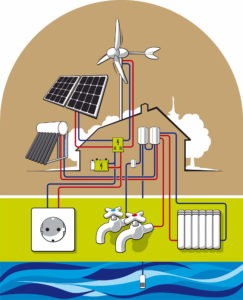Exploring the Renewable Heat Incentive (RHI) was a game-changer for homeowners, businesses, and communities looking to embrace renewable energy for heating. This innovative scheme, launched by the UK Government, supported the shift towards environmentally friendly heating technologies and offered financial incentives. Understanding the RHI was crucial in making informed decisions about renewable heating options, whether it was a domestic setting or a larger, non-domestic environment.
This guide delved deep into the Domestic Renewable Heat Incentive, shedding light on eligible heating systems like ground source heat pumps, air source heat pumps, biomass boilers, and solar thermal systems. Navigating the RHI involved understanding its workings, from the application process to the factors influencing the financial benefits. This comprehensive overview equipped you with the necessary knowledge to embark on your journey toward a more sustainable and cost-effective heating solution, ensuring that your choice is aligned with your needs and the broader goal of reducing the impact of climate change.
Contents
Key Takeaways
- The UK’s Renewable Heat Incentive (RHI) was a government initiative that provided financial incentives for installing eligible renewable heating technologies, benefitting residents in England, Scotland, and Wales.
- Domestic RHI was for private households, while non-domestic RHI was for public, commercial, or industrial purposes, with eligibility criteria and a step-by-step application process outlined in the article.
- The scheme offered quarterly cash payments for seven years, with payment calculations based on heating demand, heating system efficiency, and government tariffs. This made it a cost-effective way to transition to renewable energy and reduce heating bills
Renewable Heat Incentive (RHI)?
Launched by the UK government in 2014, RHI was a scheme that encouraged households, businesses, and communities to install heating technology that harnessed renewable energy. According to this scheme, beneficiaries would receive financial aid from the UK government to switch to renewable energy options.
It aimed to achieve the target of 12% heating coming from renewable energy by 2020 to help minimise the effects of climate change directly.
There were two types of RHI – domestic and non-domestic.
- Domestic RHI was for private households catering to a single home.
- Non-domestic RHI was for public, commercial, or industrial purposes.
In this article, we talked about the Domestic RHI in detail.
Types of heating systems that were eligible for the domestic RHI scheme included:
- Ground source heat pumps
- Air source heat pumps
- Biomass boilers
- Solar thermal
The Working of the Scheme

Renewable Heat Energy (RHI) was a financial aid program for households with renewable energy heating systems. Residents with suitable heating pumps installed in their homes could save much money in the long run.
Most people found the application process to be tedious. So, you had to know about the application process details beforehand to ensure timely approval. Every applicant had to note a few requirements regarding the home where the system was installed and the installation process. Considerable research about the right renewable heating solution and installer increases your chances of approval.
Below are some crucial stages of the application process that minimise your application’s chances of rejection.
- Step 1: Choose the right renewable energy heating system for your home.
- Step 2: Read the application form, guides and relevant policy documents carefully.
- Step 3: Find the right MCS-certified installer.
- Step 4: Installed the heating system and additional equipment as necessary.
- Step 5: Applied after filling out the application form.
Factors that influence domestic RHI payments
There were three main factors based on which the domestic RHI payments were calculated:
- Annual heating and hot water demand of your property
- Seasonal Coefficient of Performance (SCOP) of the heating system
- Latest RHI Tariffs
From the scheme’s inception until 2020, the government used a ‘degressive’ approach to manage the budget and provide for RHI payments, leading to yearly cost changes.
However, a new regulation was introduced by the UK government. According to this regulation, the Department for Business, Energy and Industrial Strategy (BEIS) announced that there would be no reduction in support starting from the beginning of the following year.
Installing an RHI Heating System
Before investing in a heating system, you had to research the different types of heating pumps and installers available in the market. Furthermore, you could weigh the pros and cons of each option and narrow down the system that worked best for your home. You could even set up consultations with experts in the field to help smoothen the process.
Whatever heating system you decided on had to be efficient and conducive to saving costs on your bills.
Alongside installing the heating system, you might also have needed metering. There were two types of metering: metering for performance and metering for payment. Metering for performance was necessary for all new heating pumps, while metering for payment was done for heat pumps, biomass boilers, and stoves. The type of metering suitable for your home depended on the heating system you installed.
Furthermore, if you chose to install a solar thermal system, you would not have required any metering.
Lastly, you had to spend a good time finalizing an installer. The only prerequisite had to be Microgeneration Certification Scheme (MCS) Certified.
Once all of this was done, you could complete your installation process.
Installing loft and cavity wall
For your heating system to have been effective, you had to install a loft and a wall cavity if your EPC recommended it. After the cavity wall was installed, you would have gotten a new EPC issued, and only then could you have applied for the RHI scheme.
If you already installed the loft and cavity wall, you could have applied for the RHI scheme immediately after installing and assessing the heating system.
If installing a loft/wall cavity wasn’t feasible, you could still have applied for RHI, given that you were eligible for exemptions.
Eligibility
You were, in all probability, eligible to apply if a renewable source generated heat for your house. There were, however, certain other factors that you had to keep in mind. These were:
- Homeowners who had an eligible technology installed could apply for RHI support. This list may have included private landlords, builders, and registered social housing providers (given they met all criteria).
- Single-domestic dwellings were also covered under the scheme.
- RHI aid was unavailable to newly built properties unless they were self-build projects.
You could also find detailed eligibility criteria and relevant details on the Ofgem website.
Application Process
The one key prerequisite for applying for the RHI scheme was that you had to live in England, Wales, or Scotland. Additionally, as mentioned earlier, you had to own any private or social property and meet all requirements.
The scheme was open for applications until 31 March 2022. You could apply online at Ofgem’s website. If you couldn’t apply online, you could contact Ofgem’s Domestic RHI Applicant Support Centre.
Documents Required
- MCS Installation Certificate (MCS) number
- Energy Performance Certificate (EPC) number
- Occupancy assessment documents
- Personal information and bank details
Property Requirements
- The property must have a domestic Energy Performance Certificate (EPC).
- It should be domestic property.
- Check if your property is eligible, and note if the heating technology heats only a single domestic property, a single property in multiple or multiple buildings.
- Previous domestic RHI accreditation.
Ongoing RHI Obligations
After applying, you automatically consented to some ongoing obligations. You had to comply with all these obligations regarding your house and the heating system installed.

An annual declaration had to be signed and renewed every year. The declaration stated that you complied with all the rules of the scheme so that the correct amount was paid for the heat generated by you. Further, there were some mandatory declarations you needed to submit; these were:
- That you still owned a heating system on your property.
- The system was in good working condition and had not been changed.
- The meter installed was in good working condition.
- Other details of the occupants of your property and your heating system.
Lastly, Ofgem conducted audit checks to ensure applicants followed all scheme rules. The government could randomly choose any applicant in the database for an audit.
FAQs
This section will be conducive to your understanding of the domestic RHI scheme. It is aimed at answering any lingering queries that you may have.
How do I get RHI payments?
After getting approved by the government, you’ll receive quarterly payments (every three months). The amount will be transferred to your bank account by a BACS transfer. It is important to note that transfers are only made to UK bank accounts that accept payments in Pound Sterling.
Who is eligible for RHI payments?
Payments are granted to owners of domestic properties who have at least one eligible heating system and have applied for financial aid. The exact amounts of these payments are determined by the type of heating system installed, the RHI tariffs and metering costs.
For how long will I receive RHI payments?
Once you have applied for RHI and your application has been approved, you will receive RHI payments quarterly for seven years. However, you must comply with ongoing obligations to complete the process smoothly. If you fail to comply, you risk not receiving payments at all. The same has been discussed in detail in the section above.
How much do I save with the Renewable Heating Incentive?
The amount of money you can save by opting for the RHI depends on the kind of your heating system, the heat you generate, and the current tariffs. You can save somewhere between £200 to £400.
Is there any VAT on RHI payments?
Generally, tax is not dependent on the scheme you opt for, domestic or non-domestic. Tax is affected by the way you utilise renewable heat. You wouldn’t be liable for income tax if you were a private landowner. However, you might have to pay tax if you’re a business owner or a trader. This is because RHI payments are business receipts, and regular income and corporate rules apply.
How much does it cost to install a heat pump system?
Installation costs depend on the heat pump’s cost, based on heating capacity and installation type.
Discover the Power of Solar with Solar Panels Network
Are you navigating the world of solar installations? Look no further than Solar Panels Network, the UK’s trusted partner in harnessing the sun’s potential. Our dedication goes beyond just installations; we’re on a mission to transform how homeowners and businesses across the UK perceive and utilise energy. By choosing us, you’re reducing your carbon footprint and making a smart financial move that promises savings for years ahead. Contact us today and embark on your solar journey.
Final Thoughts
As an in-depth analysis and memoir, this guide covers everything you need to know about the RHI scheme.
The Renewable Heating Incentive (RHI) is a well-thought-out and carefully implemented policy by the United Kingdom’s government. It is one of the best ways to minimize the effects of climate change while saving on energy bills.
Thousands of homeowners have benefited from this scheme, which you can do too! Before applying, research the heating system that best suits your needs and install it. After that, you’re just a few steps away from providing long-term benefits.
About the Author
Solar Panels Network stands at the forefront of solar energy solutions, driven by a team of seasoned solar engineers and energy consultants. With over decades of experience in delivering high-quality solar installations and maintenance, we are committed to promoting sustainable energy through customer-centric, tailored solutions. Our articles reflect this commitment, crafted collaboratively by experts to provide accurate, up-to-date insights into solar technology, ensuring our readers are well-informed and empowered in their solar energy decisions.

